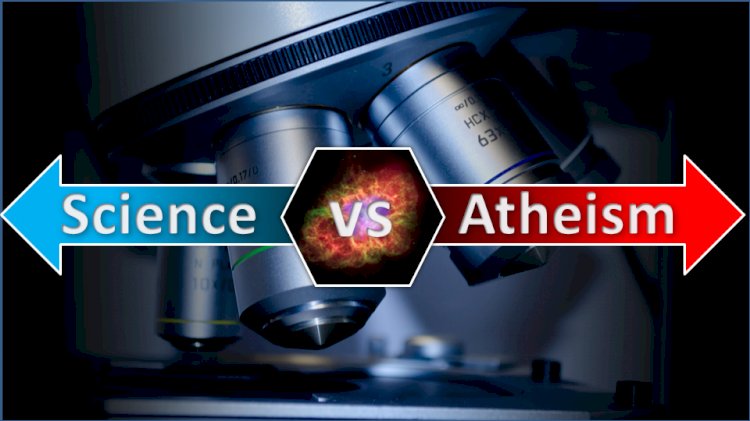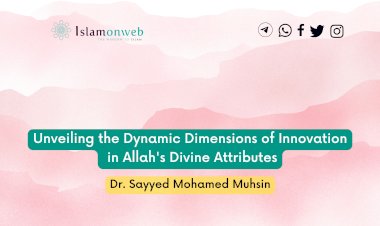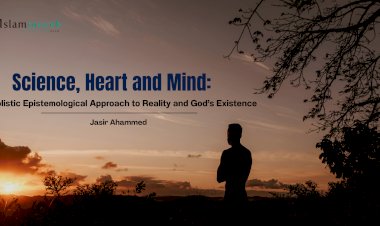Atheism and Science: Relationship of Contradictions
Since the emergence of science as a particular field of study, atheists have been found to use science as a medium to disguise atheism. These atheistic positions can be compared to a parasite that strives to grow by relying on science without producing anything on itself and gradually deconstructing the epistemology of science.
Atheism versus Science
If science is to be connected with atheistic philosophies, the primary criterion is that there should be some conceptual discussion between them. But it could be observed that atheistic science by definition is against scientific norms and its methodology.
Conceptually, the only position that atheism puts forward is that there is no God. But this fundamental worldview itself is opposed to the investigative intelligence of science. Neo-atheists like Richard Dawkins have openly admitted that it is impossible to prove that God doesn’t exist ultimately and this is why they wholeheartedly agree that no existence can be proved to be completely non-existent. To say that even the basic idea of atheistic philosophies is unjustified by the evidence is to admit that atheism is just a superstition without evidence and so, to conflate a superstition with science can be dismissed as mere wishful thinking.
The conceptual conflict between atheists and science seems not to end here. Atheism is a view that negates the existence of God without any evidence. But taking the position of ‘non-existent’ on any subject goes against the very way of thinking of science. If science is to negate any existence without evidence, research and investigative studies become irrelevant because the possibility for further studies and research on a subject that has been decided as non-existent for the first time negates the chance for further effort on it. For example, we have no evidence of aliens or other universes, but what if we use the atheist argument here that they do not exist because there is no evidence? It would be an anti-science position because the existence of something that is judged not to exist the first time does not need to be learnt later and therefore, these blind ‘non-existent’ arguments disapprove the research ideas in this field from the very beginning. Atheism is thus a superstitious movement. In short, it can be summarized that the basic position of atheism which is the denial of God is against the very basis of science.
A historical analysis of atheism reveals a similar inconsistency with what is being perceived as science or being scientific. Human civilizations such as ancient Greece, Rome and Bharat were known as centres of origin of scientific thoughts. These civilizations led to the emergence of scientific geniuses like Imhotep, Thales, Anaximander, Democritus, Anaxagoras, Pythagoras, Charakan, and Susruthan. All these were based on various concepts and visions of God. No atheistic civilization can be seen in the history that laid the foundation for the growth of science.
Man’s quest to understand the root causes of the systemically functioning universe around him has led to the foundation of modern science. The materialist hypothesis takes that using this rare life, obtained only by chance, for such investigative research methods would be unproductive. History shows that materialist thinkers have tried to submit to the futility of scientific research, having somehow fallen into the realm of randomness and thought that life is meant to be enjoyed at its maximum.
Protagoras was a staunch agnostic who argued that the use of mathematics has nothing to do with material life and therefore mathematics itself was futile. Theodorus was an arid atheist who directly admitted that the ultimate goal of human life is to enjoy at its maximum. They preached the idea that the only goal of human life was to lead a life of luxury by encouraging the consumption of butter, which was a luxury food of the time. The excessive interest in hedonism is enough to turn away even a curious genius from scientific research. Even scientific research with great caution and dedicated intelligence may give misleading results. It is natural for an atheist to shy away from an endeavor that would deprive him of a large part of his life that he values most. It was because of this that there were no significant contributions from atheists in the early decades of scientific development. As a natural consequence of atheism, ‘Charvarkas’ claimed that only perceptual knowledge is valid and therefore it can be seen that Charvakas had denied the ‘assumption’ which is very important for scientific research.
From the discussion related to the genesis of science, it is crystal clear that atheistic philosophy has adopted an approach that turns away from the methodology of science itself. Atheistic vision holds very limited philosophical judgment regarding the world. It is unfortunate to conclude that the only reality is what one directly experiences from the material surroundings. It can be understood that the very foundation of atheistic views is based on this substandard logic.
Absolutely, there is no great relevance for thinking about what happened in the initial moments of the universe or what are the black holes beyond the light years for those who imagine that there is nothing beyond that to know about the world because the very foundation of materialistic vision rests on killing human curiosity. In contrast, science is the product of human curiosity. Despite the historical relationship of atheists to science, the general atheist discourse is that they have a monopoly on science.
Even in the history of modern science, the believers who followed religious philosophies are seen at the forefront of bringing it up. Gregor Mandel, the father of modern genetics, was a Christian priest. Isaac Newton, the core cause of all modern advances in physics, introduced the universe as God’s creation. Max plank, known as the father of quantum mechanics, and Albert Einstein, known as the father of modern physics, were among those who approved of the existence of God behind the universe. It was only after the field of science turned into a cash cow, the atheists began to appear in scientific world. How paradoxical is it to see these people who cannot be conceptually, historically, and in any way connected to science claiming a total monopoly over science?
Science and Islam
If we look at Arabia after the Prophet ﷺ, we can observe the rapid development in all fields, as well as in the field of science. Stretching from the seventh century onwards, this period, rich with scientific geniuses, is described as the golden age of science. Many great geniuses who mastered everything from medicine, psychology, and physics to chemistry, mathematics, and philosophy were developed from a society that remained intellectually unknown until the sixth century. Historians have assessed that it was the Islamic world where many works of knowledge were arrived for knowledge acquisition in the medieval period and thus resulted in the educational renaissance across the European continent. The translation of many Arabic works to Latin during the medieval period is said to be the reason for such scholarly exchange. Countries like Spain and Sicily connected Europe with the Islamic world. The question ends with Islam as to what kind of intervention in history could have caused a sudden intellectual revolution among tribal people who were till then illiterate.
This Islamic influence is also a historically clear example of how an idea can lead to the persuasive and scientific development of subsequent societies. The primary thing Islam did in this course was to inculcate scientific consciousness in human beings. However, merely memorizing some scientific truths and presenting lectures on it doesn’t make any scientific consciousness. The Indian scientists, who send satellites to space and crack coconut as a ritual, make us understand the contradiction between these two.
However, when humans have the intellect to learn, think about, and use their environment correctly, its product is what comes to emerge as scientific and technologically wise development. In this way, Islam inculcated the scientific method of thinking in humans through a community and only such an approach can influence human development over centuries.
References;
- Elaine Howard Ecklund and David R.Jhonson ,Varities of atheism in science , 2021
- Anthony Walsh, Answering the new atheists; how science points to God and to the benefits of Christianity, ISBN: 9781622735143
- Marcelo Gleiser, the Island of knowledge; the limits of science and the search for meaning, 2014
- Charles whittlesey, Theism and atheism in science, 1886, northwestern university USA
About author:
Unais Kashmir is a PG Research scholar at Darul Huda Islamic University, Chemmad.
Email: uniceunais@gmail.com
Disclaimer
The views expressed in this article are the author’s own and do not necessarily mirror Islamonweb’s editorial stance.
























Leave A Comment